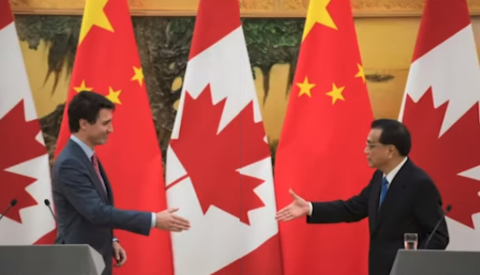In The Dominion Ben Woodfinden considers the return of foreign policy concerns to Canadian politics after a multi-decade disappearance:
The collapse of the Soviet Union ushered in what the late Charles Krauthammer, in a famous Foreign Affairs essay [PDF], called the “unipolar moment” in which the United States became the unquestioned global hegemon, with no true political, economic, or ideological rivals left. We have been living for the last three decades in this moment.
But Krauthammer’s use of “moment” is deliberate. Krauthammer readily admitted that unipolarity was temporary, and that “no doubt, multipolarity will come in time.” Were he alive today, Krauthammer would probably be ready to proclaim the unipolar moment over. Great power rivalry is back, and the COVID-19 pandemic has accelerated this, killing off any hopes that the relationship between an increasingly aggressive China and the United States could be anything other than adversarial.
This rivalry looks set to become the defining feature of the post-COVID international order, and as the Meng Wanzou case and the kidnapping of the two Michaels reveals, Canada finds itself unavoidably caught in the middle of this burgeoning rivalry. Where Canada fits into this is now one of the most important questions facing our country today.
Canada’s relationship with the United States is our most important relationship. We are unavoidably connected to our neighbour, and our relationship with the United States is a largely amiable one. But despite our integration and close ties with America, Canada remains a sovereign nation, and most Canadians retain a desire for Canada to continue to behave and act like one. Similarly, while it is a Canadian pastime to criticize the flaws and failings of our southern neighbour, we still share the same fundamental democratic values. Thus when it comes to figuring out where Canada stands in the middle of this new great power rivalry, we have little choice but to be broadly aligned with the United States and other free democratic nations.
[…]
Canada can accomplish these goals by prioritizing the strengthening of our relationship with other democratic nations that share our values and are also wary of the rise of an aggressive China with global ambitions. There is no shortage of other nations that fit this description. Most obvious are other Commonwealth nations with which we share common values and history. I’ve written before here in defence of CANZUK, a proposed agreement between Canada, Australia, New Zealand, and the United Kingdom that would strengthen economic ties and prioritize foreign policy and military coordination between these four nations. This is a good start, and strengthening the relationship between other Westminster nations to ensure that we all have an independent voice alongside America would be valuable to all prospective CANZUK members. [Federal Conservative leader Erin] O’Toole was an early supporter of CANZUK during his 2017 leadership bid, and this is something we should prioritize.
Another Commonwealth nation that Canada should prioritize the strengthening of economic and political relations with is India, a nation also threatened by an assertive China. While Canada-India relations have soured under the current government, rebuilding this relationship should be a priority. The current Indian government is not without its controversies and diaspora politics in Canada is complicated to put it mildly. But in the face of a confrontational and dangerous Chinese regime, we don’t have much choice other than to pursue closer and warmer relations with India, even if this will displease some.




